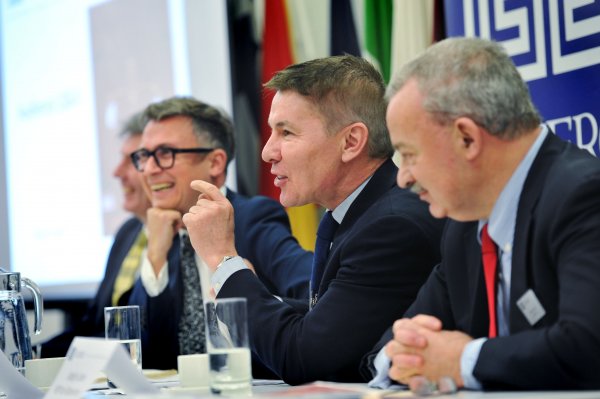Business Culture: The Business Experience
Business Style
After trading around the globe for centuries, the British have finely honed their business style. They understand the value of fair trade, and can be counted on to be reliable business partners. The British also can be quite reserved and private, and they adhere to strict protocols that can prove daunting to foreign visitors.
However, because of the worldwide tech boom and globalization, Britain's traditional revered business culture is changing. For example, high-tech firms in the United Kingdom have adopted a much less stringent approach to business than older firms. Many younger firms resemble businesses in the United States, in that power is more evenly distributed, while the well-established, more venerable firms have retained their deeply entrenched hierarchal system, where decisions are only made by the top brass, who prefer to deal with others at their level. However, the newer approach does not necessarily make the visitor's life easier: in firms with a team-based approach, responsibilities can be blurred, which can make it difficult for a foreign visitor to get a clear picture of the organization's structure.
The British greatly value diplomacy, so directness will not be looked on too kindly in the UK. A British businessperson will often use humor to diffuse any tense situation, and this shouldn't be taken as your UK counterpart not taking you or your business proposal seriously; it's just a way to keep the conversation even-keeled and to avoid confrontation. The visitor should also keep in mind that being overly positive or even arrogant about what you can offer will likely be frowned upon. In the UK, it is better to be self-deprecating than self-aggrandizing. The British are famously reserved, and when doing business with them, so should you be. Avoid hard-sell or slick business tactics, as British businesspeople regard solid facts and figures as the only legitimate forms of persuasion.
Relationship Building
The foreign businessperson needs to remember that the British are quite formal and not physically demonstrative, and maintaining physical space is important. They also do not like being asked personal questions, and will likely not ask any of you.
For the foreign businessperson, breaking barriers in the UK can prove difficult. But despite their traditional reserved veneer, the British look for long-term relationships with the companies and people they do business with, so going after a quick deal is not recommended. In order to achieve a long-term connection, a recommended first step is to find a third party to make an introduction. But if dealing with the younger generation, long-standing relationships don't always need to be established prior to doing business, nor does one need to find an intermediary to make introductions. However, with the established firms, relationship building is still crucial for long-term business success.
Etiquette
In the UK, punctuality is taken quite seriously, so arriving on time is imperative. If you know that you will be late to a meeting, always call ahead to let someone know, as not doing this shows you are not serious about the meeting, and therefore not serious about doing business together.
When meeting someone in the UK, a handshake is the usual form of greeting. This is not like some other countries in Continental Europe, where a hug or kiss on the cheek is a common form of greeting. You should maintain eye contact while greeting a UK businessperson, but avoid prolonged eye contact, as it will make them uncomfortable. In the meeting itself, a senior-ranking person will do most of the talking, and their address will be quite formal, and will have a clearly defined purpose.
Always know whom you are talking to. The United Kingdom is comprised of four countries: England, Scotland, Wales, and Northern Ireland. If you happen to be in London, and your UK counterpart lives there, but is originally from Wales, for example, your counterpart most likely thinks of him or herself as Welsh, not English. It is important to not only be aware of the UK's geographical distinctions, but also the strong sense of identity and nationalism felt by the citizens of each constituent country. Keep in mind that "British" means someone who is from England, Scotland, Wales, or Northern Ireland, but "English" is reserved for those from England, while people from Scotland are "Scottish." Those from Northern Ireland, which is also known as Ulster, are sometimes referred to as "Irish," but because of sectarian and cultural differences, this can be a touchy subject. The nonsectarian, politically correct term is "Northern Irish," as "Irish" generally refers to people from the Republic of Ireland, which is not part of the United Kingdom. Referring to someone in the UK as something they are not will likely offend them.
Article written for World Trade Press by Dale Patrick Myers.
Copyright © 1993—2024 World Trade Press. All rights reserved.

 United Kingdom
United Kingdom 



